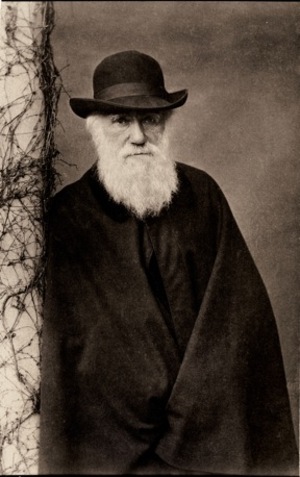Late last fall, the Church of England issued a formal apology to Charles Darwin for "misunderstanding [him] and … encouraging others to misunderstand [him] still." While couching their apology in a warning of the social interpretation of Darwin’s work, the fact that it took 150 years since the publication of Darwin’s Origin of Species is testament to the great divide that his work created.
Since this Thursday is the bicentennial of Charles Darwin‘s birth — the 200th anniversary of the birthdate of the boy who, encouraged by his free-thinking father, would later create one of the most important documents in scientific history, while sparking off one of the longest running controversies of the modern age — we thought it would be a good idea to take a quick look at the key events in his career … an incredibly brief summary of a man who lived a very full life.

 Darwin was interested in science from an early age, thanks to his father’s occupation as a doctor and he often helped his father treat patients. Charles planned to follow his dad in medicine, but became distracted by the countless plants, bugs and animals nature had to offer. It was because of this interest that he turned his back on medicine and signed up for a scientific – and fateful – expedition on the HMS Beagle.
Darwin was interested in science from an early age, thanks to his father’s occupation as a doctor and he often helped his father treat patients. Charles planned to follow his dad in medicine, but became distracted by the countless plants, bugs and animals nature had to offer. It was because of this interest that he turned his back on medicine and signed up for a scientific – and fateful – expedition on the HMS Beagle.
On the voyage, Darwin studied both the geology and biology of the many stops during the Beagle’s five year cruise. And, leaning on his religious upbringing, he hoped his trip would identify "centres of creation" to further explain how species were distributed under God’s hand. Yet, Darwin saw plenty on this trip that made him doubt the idea of creationism.
However, it wasn’t until his return to England that he began to really put his ideas to paper. He spent the next two decades considering what he had seen, conducting research projects and developing his theories on natural selection and evolution.
Though his theory of evolution was developed, Darwin – like Copernicus before him – held it back from finalizing publication for more than a decade. He was acutely aware of the impact his writings would have on people’s understanding of the origins of man. It is also believed that Darwin held off publication out of respect for his wife’s religious views.
But in 1858, he learned that a similar theory by Alfred Russel Wallace was being developed. Darwin knew the time had arrived and quickly finished his own book, then published it as "On the Origin of Species by Means of Natural Selection, or The Preservation of Favoured Races in the Struggle for Life" the following year.
Atheists, scientists and many free thinking people quickly spoke up in defense of Darwin’s theories. While there were some in the Church of
England who also spoke favorably of Darwin’s book, it was from within the church that his biggest detractors would come. It was a time of evangelicalism and the Bible was meant to be read literally. The idea that creationism was being challenged was too much for some to handle.
But by and large, the debate was overwhelmed by the novelty and veracity of Darwin’s theory. In less than a decade, Darwin’s theories were accepted as fact in
Europe. Origin of Species was translated into several languages and the book hit its fifth edition after the first ten years of publication.
Darwin continued to work, publishing various papers over the years, and his other major book, The Descent of Man in 1871. Like Origin of Species, it was an immediate success, but (unlike Origins) avoided much criticism from the church.
He wrote his autobiography in 1876 and subsequently created several papers on orchids and plants, but by early 1881 declared that his life’s work was done and that he was "bored" with nothing left to challenge him. Charles Darwin died the following year, in 1882, and was buried in the Nave of Westminster Abbey, not far from the tomb of Isaac Newton.
Darwin’s theories continue to resonate today — not just in the sciences, but in the news concerning education in America. Interestingly enough, nearly all parochial schools include evolution in their science classes. However, the controversy continues to rage in the nation’s public schools.
It is difficult to imagine what Charles Darwin would think about the ongoing hullabaloo his work has created — especially in schools. He would probably be more than a little frustrated. After all, if his first critics, the Church of England, the group who has had the most time and opportunity to pick apart his arguments and theories, can accept the importance of work, why can’t everyone else?


